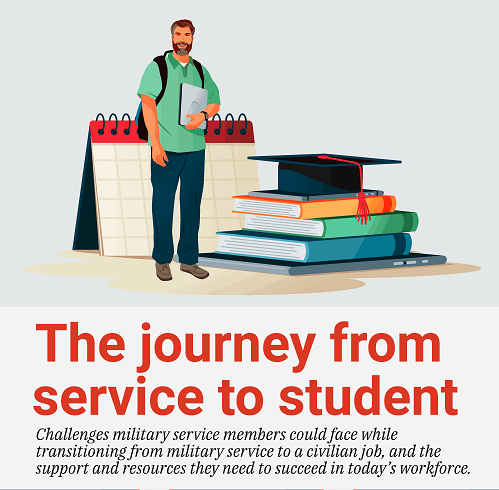Why military veterans often make great leaders

Written by Laurie Davies

Anatomy of a U.S. military member
If you’ve ever wondered where great leaders get their decisiveness and problem-solving skills, sometimes you need look no further than the U.S. Armed Forces.
A Harris Poll survey commissioned by University of Phoenix (UOPX) reveals that the most important qualities active-duty military members and veterans believe they can bring into a civilian organization from the military are:
- Leadership skills (54%)
- Teamwork (51%)
- Ability to adapt quickly (49%)
Whether you’re prior military looking to get into business management or a hiring manager who needs a strong leader, military experience may deliver an edge. Here’s why.
Experience with diverse populations
Veterans are well versed in working with diverse populations, both inside and outside their military cohort.
On the inside, military servicemen and servicewomen constitute a cross section of society that works together to solve problems, sometimes in the face of danger.
On the outside, at one point or another, most ship off to foreign countries. Sometimes, they need to win over locals in addition to winning the mission.
How does this help make a leader?
Eric Ryan, senior director of military operations at UOPX and a former U.S. Marine Corps sergeant, says military veterans often experience something like the “overview effect" when they serve, a phenomenon described by astronauts in orbit.
“They look down on Earth and don’t see nationalism, boundaries and conflicts,” Ryan says. “We didn’t leave the Earth, but we leave the country. And we see human beings just trying to live their lives like we are.”
The resulting empathy can translate well to leadership within an organization.
Leadership development
Military members have been attending basic training for generations. “You’d be hard-pressed to find any organization that does leadership training better than the U.S. military. Every minute of military training is all about conditioning you to manage stressful situations and respond in a methodical way,” Ryan says.
Meanwhile, people who sign up for the military often seek a challenge. They want to do hard things.
This intersection, Ryan says, is where leadership is born.
Veterans also have a tremendous appreciation of leadership and teamwork. “In the Marine Corps, we were never able to just stand or sit by ourselves. We were always lined up back-to-back. We thought, ‘It’s hot out. Why are we doing this?’ But they were training out of us the sense of self. Everything is a team effort,” Ryan says.
Skills and character
Out of this training and teamwork emerge the types of leadership skills and character that are prized in today’s workplaces. These include:
- Competence
- Confidence
- Decisiveness
- Discipline
- Teamwork
- Understanding of logistics
- Problem-solving
- Remaining calm under pressure
- Sense of duty
- Sacrifice
The first two traits tie together closely. “Military veterans make it their business to be competent,” Ryan says, remembering a fellow Marine who was in a dangerous, forward-operating position in Iraq in 2003 when his aircraft failed. He cannibalized parts, reworked a hydraulics system and got his team and craft back to base safely.
“This was not an easy thing,” Ryan says. “But he had the competence and confidence in the face of danger to take on the problem.”
Leadership qualities
How can military leadership qualities translate to the workplace? After all, enemies don’t point weapons at you in the boardroom if your PowerPoint fails. And it would be weird to sit back-to-back in cubicles.
But what if a global pandemic shifts your business model overnight? Or the so-called “Great Resignation” has you scrambling to hire — and retain — quality people right now?
Veterans have leadership qualities that translate well to the workforce, but making the transition to a civilian career isn’t without challenges. In fact, the Harris Poll cited earlier reveals some of the realities.
Click the image above to view the full infographic.
In addition to the education and resources needed to transition into a civilian career, veterans can bring to the table leadership qualities like the following:
1. Trust-building. There’s a tense scene in the movie Saving Private Ryan when Tom Hanks defuses troop infighting by revealing he’s a small-town English teacher back home. Cue the music and monologue, and the trust from his troops builds to a climax. Sure, it’s cinema. But in real life, great leaders inspire trust. This helps them stay focused on the mission.
2. Problem-solving. Many veterans make smart decisions under pressure. This can translate well to negotiating contracts, selecting contractors, prioritizing a project’s deadline or managing egos.
3. A sense of calm under pressure. Remaining calm under duress inspires unity. “When you can solve problems calmly, people want to follow that person. In the toughest of situations, people tend to fall in line behind a strong leader,” Ryan says.
4. Motivational skill. Because of the “overview effect” described earlier, many veterans have the ability to lead diverse people toward a common goal. Call it relational IQ, respect or empathy — or all three — but good leaders have it.
5. Efficiency. Veterans are accustomed to keeping the mission moving forward. They focus on progress, not perfection.
6. Serving the greater good. “Military personnel are looking for a sense of something greater than self. The first thing we do is swear an oath to protect the United States against all enemies — foreign and domestic. That’s a big thing,” Ryan says.
In the end, Veterans tend to have a strong focus on building other people and making them feel bigger together than they were alone. And that kind of leader can make all the difference.

ABOUT THE AUTHOR
A journalist-turned-marketer, Laurie Davies has been writing since her high school advanced composition teacher told her she broke too many rules. She has worked with University of Phoenix since 2017, and currently splits her time between blogging and serving as lead writer on the University’s Academic Annual Report. Previously, she has written marketing content for MADD, Kaiser Permanente, Massage Envy, UPS, and other national brands. She lives in the Phoenix area with her husband and son, who is the best story she’s ever written.
This article has been vetted by University of Phoenix's editorial advisory committee.
Read more about our editorial process.
Read more articles like this:



